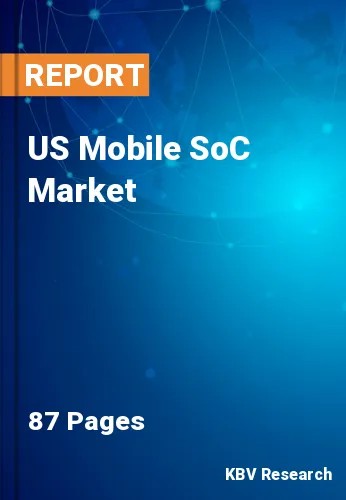Chapter 1. Market Scope & Methodology
1.1 Market Definition
1.2 Objectives
1.3 Market Scope
1.4 Segmentation
1.4.1 US Mobile SoC Market, by Operating System
1.4.2 US Mobile SoC Market, by Core Type
1.5 Methodology for the research
Chapter 2. Market Overview
2.1 Introduction
2.1.1 Overview
2.1.1.1 Market Composition and Scenario
2.2 Key Factors Impacting the Market
2.2.1 Market Drivers
2.2.2 Market Opportunities
2.2.3 Market Restraints
2.2.4 Market Challenges
2.2.5 Market Trends
Chapter 3. Competition Analysis - Global
3.1 KBV Cardinal Matrix
3.2 Recent Industry Wide Strategic Developments
3.2.1 Partnerships, Collaborations and Agreements
3.2.2 Product Launches and Product Expansions
3.2.3 Acquisition and Mergers
3.3 Top Winning Strategies
3.3.1 Key Leading Strategies: Percentage Distribution (2019-2023)
3.3.2 Key Strategic Move: (Product Launches and Product Expansions: 2021, Dec – 2024, Jan) Leading Players
3.4 Porter Five Forces Analysis
Chapter 4. US Mobile SoC Market
4.1 US Mobile SoC Market by Operating System
4.2 US Mobile SoC Market by Core Type
Chapter 5. Company Profiles – Global Leaders
5.1 Unisoc (Shanghai) Technologies Co., Ltd. (Wise Road Capital LTD)
5.1.1 Company Overview
5.1.2 Recent strategies and developments:
5.1.2.1 Partnerships, Collaborations, and Agreements:
5.2 HiSilicon (Shanghai) Technologies CO., LIMITED (Huawei Technologies Co., Ltd.) (Huawei Investment & Holding Co., Ltd.)
5.2.1 Company Overview
5.2.2 Financial Analysis
5.2.3 Segmental and Regional Analysis
5.2.4 Research & Development Expense
5.3 NVIDIA Corporation
5.3.1 Company Overview
5.3.2 Financial Analysis
5.3.3 Segmental and Regional Analysis
5.3.4 Research & Development Expenses
5.3.5 Recent strategies and developments:
5.3.5.1 Partnerships, Collaborations, and Agreements:
5.3.6 SWOT Analysis
5.4 Intel Corporation
5.4.1 Company Overview
5.4.2 Financial Analysis
5.4.3 Segmental and Regional Analysis
5.4.4 Research & Development Expenses
5.4.5 Recent strategies and developments:
5.4.5.1 Partnerships, Collaborations, and Agreements:
5.4.5.2 Product Launches and Product Expansions:
5.4.5.3 Acquisition and Mergers:
5.4.6 SWOT Analysis
5.5 Apple, Inc.
5.5.1 Company Overview
5.5.2 Financial Analysis
5.5.3 Regional Analysis
5.5.4 Research & Development Expense
5.5.5 Recent strategies and developments:
5.5.5.1 Product Launches and Product Expansions:
5.5.6 SWOT Analysis
5.6 Advanced Micro Devices, Inc.
5.6.1 Company Overview
5.6.2 Financial Analysis
5.6.3 Segmental and Regional Analysis
5.6.4 Research & Development Expenses
5.6.5 Recent strategies and developments:
5.6.5.1 Partnerships, Collaborations, and Agreements:
5.6.5.2 Product Launches and Product Expansions:
5.6.5.3 Acquisition and Mergers:
5.6.6 SWOT Analysis
5.7 Qualcomm Incorporated
5.7.1 Company Overview
5.7.2 Financial Analysis
5.7.3 Segmental and Regional Analysis
5.7.4 Research & Development Expense
5.7.5 Recent strategies and developments:
5.7.5.1 Product Launches and Product Expansions:
5.7.5.2 Acquisition and Mergers:
5.7.6 SWOT Analysis
5.8 MediaTek, Inc.
5.8.1 Company Overview
5.8.2 Financial Analysis
5.8.3 Regional Analysis
5.8.4 Research & Development Expenses
5.8.5 Recent strategies and developments:
5.8.5.1 Product Launches and Product Expansions:
5.8.6 SWOT Analysis
5.9 NXP Semiconductors N.V.
5.9.1 Company Overview
5.9.2 Financial Analysis
5.9.3 Regional Analysis
5.9.4 Research & Development Expense
5.9.5 Recent strategies and developments:
5.9.5.1 Product Launches and Product Expansions:
5.9.6 SWOT Analysis
5.10. Samsung Electronics Co., Ltd. (Samsung Group)
5.10.1 Company Overview
5.10.2 Financial Analysis
5.10.3 Segmental and Regional Analysis
5.10.4 Recent strategies and developments:
5.10.4.1 Partnerships, Collaborations, and Agreements:
5.10.5 SWOT Analysis

